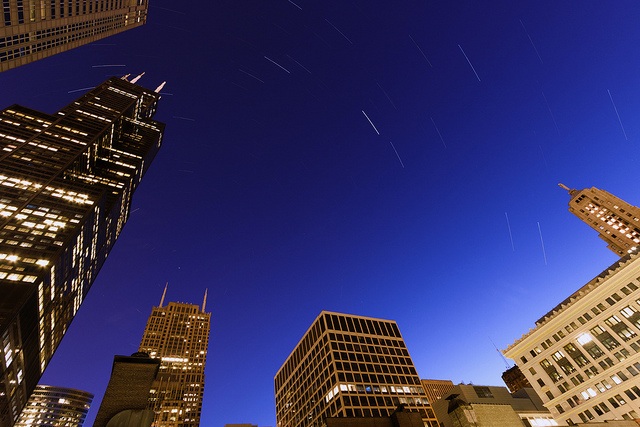Shooting Stars To Light Up The Sky This Weekend
By Steven Pate in Miscellaneous on Apr 18, 2012 8:20PM
 (Photo by John Crouch) This time every April (or at least the last 2,600 or so of them), the Lyrid meteor shower lights up the night sky. You might not realize that if you live in the city, but trust us: Pack a few chairs, a couple of blankets and a thermos of something warm, drive an hour or so from Chicago late this Saturday night til you find somewhere dark, and look up and to the north-northeastern part of the sky. You won't regret it.
(Photo by John Crouch) This time every April (or at least the last 2,600 or so of them), the Lyrid meteor shower lights up the night sky. You might not realize that if you live in the city, but trust us: Pack a few chairs, a couple of blankets and a thermos of something warm, drive an hour or so from Chicago late this Saturday night til you find somewhere dark, and look up and to the north-northeastern part of the sky. You won't regret it.
That's because this year is particularly good for watching the Lyrids, as the new moon means no interference from that pesky lunar light. As long as it's not too cloudy, you should see a slow flurry of shooting stars about as bright as the stars of the Big Dipper. These are dust-sized pieces of the comet Thatcher hitting the Earth's atmosphere at 110,000 mph and providing a pretty good show. Usually about 20 shooting stars are observed per hour, though at least one year it got as high as 90. That's a lot of wishes.
Your best bet is will be after midnight on Saturday, April 21. Get yourself somewhere where a clear sky is available and enjoy the show. Sometimes one or two larger chunks will make their way through, which stargazers call "fireballs." These more spectacular displays may be not unlike the one seen across the Midwest a few nights ago.
The Lyrids are not the brightest of the meteor showers, but it's better to have a moonless night for a less-intense meteor show than a too-bright sky erasing a theoretically more spectacular one. Since August's Perseid shooting star show will be fighting off a waning crescent moon and a waxing crescent moon will interfere with November's Leonid meteor shower, we say to get while the getting is good. The best time to catch them at their peak will be starting about midnight.
If you can't make it out to a light-pollution-free spot to take in the meteor shower, you can watch a live video feed and chat with meteor experts on the NASA website or even listen to the spooky sounds of the meteors as they hurtle towards Earth.